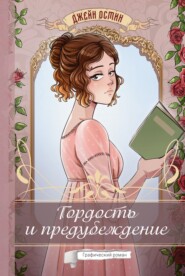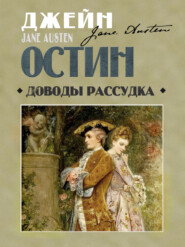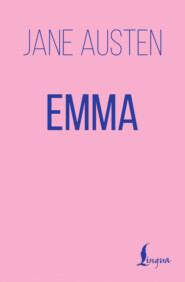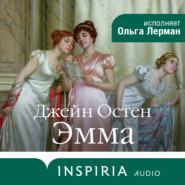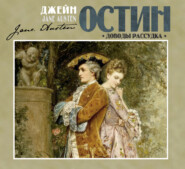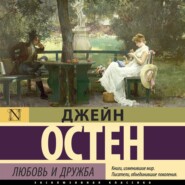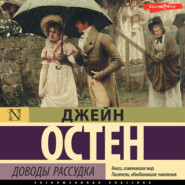По всем вопросам обращайтесь на: info@litportal.ru
(©) 2003-2025.
✖
Pride and Prejudice
Автор
Год написания книги
2019
Настройки чтения
Размер шрифта
Высота строк
Поля
CHAPTER 5 (#ulink_f268b67f-95ee-5c75-927a-3f6dec8f0b5d)
Within a short walk of Longbourn lived a family with whom the Bennets were particularly intimate. Sir William Lucas had been formerly in trade in Meryton, where he had made a tolerable fortune and risen to the honour of knighthood by an address to the King during his mayoralty. The distinction had perhaps been felt too strongly. It had given him a disgust to his business and to his residence in a small market town; and quitting them both, he had removed with his family to a house about a mile from Meryton, denominated from that period Lucas Lodge, where he could think with pleasure of his own importance, and, unshackled by business, occupy himself solely in being civil to all the world. For though elated by his rank, it did not render him supercilious; on the contrary, he was all attention to every body. By nature inoffensive, friendly and obliging, his presentation at St. James’s had made him courteous.
Lady Lucas was a very good kind of woman, not too clever to be a valuable neighbour to Mrs Bennet. – They had several children. The eldest of them, a sensible, intelligent young woman, about twenty-seven, was Elizabeth’s intimate friend.
That the Miss Lucases and the Miss Bennets should meet to talk over a ball was absolutely necessary; and the morning after the assembly brought the former to Longbourn to hear and to communicate.
‘You began the evening well, Charlotte,’ said Mrs Bennet with civil self-command to Miss Lucas. ‘You were Mr Bingley’s first choice.’
‘Yes; – but he seemed to like his second better.’
‘Oh! – you mean Jane, I suppose – because he danced with her twice. To be sure that did seem as if he admired her – indeed I rather believe he did – I heard something about it – but I hardly know what – something about Mr Robinson.’
‘Perhaps you mean what I overheard between him and Mr Robinson; did not I mention it to you? Mr Robinson’s asking him how he liked our Meryton assemblies, and whether he did not think there were a great many pretty women in the room, and which he thought the prettiest? and his answering immediately to the last question – “Oh! the eldest Miss Bennet beyond a doubt, there cannot be two opinions on that point.”’
‘Upon my word! – Well, that was very decided indeed – that does seem as if – but, however, it may all come to nothing, you know.’
‘My overhearings were more to the purpose than yours, Eliza,’ said Charlotte. ‘Mr Darcy is not so well worth listening to as his friend, is he? – Poor Eliza! – to be only just tolerable.’
‘I beg you would not put it into Lizzy’s head to be vexed by his ill-treatment, for he is such a disagreeable man that it would be quite a misfortune to be liked by him. Mrs Long told me last night that he sat close to her for half an hour without once opening his lips.’
‘Are you quite sure, ma’am? – is not there a little mistake?’ said Jane. – ‘I certainly saw Mr Darcy speaking to her.’
‘Aye – because she asked him at last how he liked Netherfield, and he could not help answering her; – but she said he seemed very angry at being spoke to.’
‘Miss Bingley told me,’ said Jane, ‘that he never speaks much unless among his intimate acquaintance. With them he is remarkably agreeable.’
‘I do not believe a word of it, my dear. If he had been so very agreeable, he would have talked to Mrs Long. But I can guess how it was; every body says that he is ate up with pride, and I dare say he had heard somehow that Mrs Long does not keep a carriage, and had come to the ball in a hack chaise.’
‘I do not mind his not talking to Mrs Long,’ said Miss Lucas, ‘but I wish he had danced with Eliza.’
‘Another time, Lizzy,’ said her mother, ‘I would not dance with him, if I were you.’
‘I believe, ma’am, I may safely promise you never to dance with him.’
‘His pride,’ said Miss Lucas, ‘does not offend me so much as pride often does, because there is an excuse for it. One cannot wonder that so very fine a young man, with family, fortune, every thing in his favour, should think highly of himself. If I may so express it, he has a right to be proud.’
‘That is very true,’ replied Elizabeth, ‘and I could easily forgive his pride, if he had not mortified mine.’
‘Pride,’ observed Mary, who piqued herself upon the solidity of her reflections, ‘is a very common failing I believe. By all that I have ever read, I am convinced that it is very common indeed, that human nature is particularly prone to it, and that there are very few of us who do not cherish a feeling of self-complacency on the score of some quality or other, real or imaginary. Vanity and pride are different things, though the words are often used synonymously. A person may be proud without being vain. Pride relates more to our opinion of ourselves, vanity to what we would have others think of us.’
‘If I were as rich as Mr Darcy,’ cried young Lucas, who came with his sisters, ‘I should not care how proud I was. I would keep a pack of foxhounds, and drink a bottle of wine every day.’
‘Then you would drink a great deal more than you ought,’ said Mrs Bennet; ‘and if I were to see you at it, I should take away your bottle directly.’
The boy protested that she should not; she continued to declare that she would, and the argument ended only with the visit.
CHAPTER 6 (#ulink_c638a010-2db7-5b09-afd5-4af87af5976c)
The ladies of Longbourn soon waited on those of Netherfield. The visit was returned in due form. Miss Bennet’s pleasing manners grew on the good-will of Mrs Hurst and Miss Bingley; and though the mother was found to be intolerable and the younger sisters not worth speaking to, a wish of being better acquainted with them was expressed towards the two eldest. By Jane this attention was received with the greatest pleasure; but Elizabeth still saw superciliousness in their treatment of every body, hardly excepting even her sister, and could not like them; though their kindness to Jane, such as it was, had a value, as arising in all probability from the influence of their brother’s admiration. It was generally evident whenever they met, that he did admire her; and to her it was equally evident that Jane was yielding to the preference which she had begun to entertain for him from the first, and was in a way to be very much in love; but she considered with pleasure that it was not likely to be discovered by the world in general, since Jane united with great strength of feeling a composure of temper and a uniform cheerfulness of manner, which would guard her from the suspicions of the impertinent. She mentioned this to her friend Miss Lucas.
‘It may perhaps be pleasant,’ replied Charlotte, ‘to be able to impose on the public in such a case; but it is sometimes a disadvantage to be so very guarded. If a woman conceals her affection with the same skill from the object of it, she may lose the opportunity of fixing him; and it will then be but poor consolation to believe the world equally in the dark. There is so much of gratitude or vanity in almost every attachment, that it is not safe to leave any to itself. We can all begin freely – a slight preference is natural enough; but there are very few of us who have heart enough to be really in love without encouragement. In nine cases out of ten, a woman had better shew more affection than she feels. Bingley likes your sister undoubtedly; but he may never do more than like her, if she does not help him on.’
‘But she does help him on, as much as her nature will allow. If I can perceive her regard for him, he must be a simpleton indeed not to discover it too.’
‘Remember, Eliza, that he does not know Jane’s disposition as you do.’
‘But if a woman is partial to a man, and does not endeavour to conceal it, he must find it out.’
‘Perhaps he must, if he sees enough of her. But though Bingley and Jane meet tolerably often, it is never for many hours together; and as they always see each other in large mixed parties, it is impossible that every moment should be employed in conversing together. Jane should therefore make the most of every half hour in which she can command his attention. When she is secure of him, there will be leisure for falling in love as much as she chuses.’
‘Your plan is a good one,’ replied Elizabeth, ‘where nothing is in question but the desire of being well married; and if I were determined to get a rich husband, or any husband, I dare say I should adopt it. But these are not Jane’s feelings; she is not acting by design. As yet, she cannot even be certain of the degree of her own regard, nor of its reasonableness. She has known him only a fortnight. She danced four dances with him at Meryton; she saw him one morning at his own house, and has since dined in company with him four times. This is not quite enough to make her understand his character.’
‘Not as you represent it. Had she merely dined with him, she might only have discovered whether he had a good appetite; but you must remember that four evenings have been also spent together – and four evenings may do a great deal.’
‘Yes; these four evenings have enabled them to ascertain that they both like Vingt-un better than Commerce; but with respect to any other leading characteristic, I do not imagine that much has been unfolded.’
‘Well,’ said Charlotte, ‘I wish Jane success with all my heart; and if she were married to him tomorrow, I should think she had as good a chance of happiness as if she were to be studying his character for a twelvemonth. Happiness in marriage is entirely a matter of chance. If the dispositions of the parties are ever so well known to each other, or ever so similar beforehand, it does not advance their felicity in the least. They always contrive to grow sufficiently unlike afterwards to have their share of vexation; and it is better to know as little as possible of the defects of the person with whom you are to pass your life.’
‘You make me laugh, Charlotte; but it is not sound. You know it is not sound, and that you would never act in this way yourself.’
Occupied in observing Mr Bingley’s attentions to her sister, Elizabeth was far from suspecting that she was herself becoming an object of some interest in the eyes of his friend. Mr Darcy had at first scarcely allowed her to be pretty; he had looked at her without admiration at the ball; and when they next met, he looked at her only to criticise. But no sooner had he made it clear to himself and his friends that she had hardly a good feature in her face, than he began to find it was rendered uncommonly intelligent by the beautiful expression of her dark eyes. To this discovery succeeded some others equally mortifying. Though he had detected with a critical eye more than one failure of perfect symmetry in her form, he was forced to acknowledge her figure to be light and pleasing; and in spite of his asserting that her manners were not those of the fashionable world, he was caught by their easy playfulness. Of this she was perfectly unaware; – to her he was only the man who made himself agreeable no where, and who had not thought her handsome enough to dance with.
He began to wish to know more of her, and as a step towards conversing with her himself, attended to her conversation with others. His doing so drew her notice. It was at Sir William Lucas’s, where a large party were assembled. ‘What does Mr Darcy mean,’ said she to Charlotte, ‘by listening to my conversation with Colonel Forster?’
‘That is a question which Mr Darcy only can answer.’
‘But if he does it any more, I shall certainly let him know that I see what he is about. He has a very satirical eye, and if I do not begin by being impertinent myself, I shall soon grow afraid of him.’
On his approaching them soon afterwards, though without seeming to have any intention of speaking, Miss Lucas defied her friend to mention such a subject to him, which immediately provoking Elizabeth to do it, she turned to him and said,
‘Did not you think, Mr Darcy, that I expressed myself uncommonly well just now, when I was teasing Colonel Forster to give us a ball at Meryton?’
‘With great energy; – but it is a subject which always makes a lady energetic.’
‘You are severe on us.’
‘It will be her turn soon to be teased,’ said Miss Lucas. ‘I am going to open the instrument, Eliza, and you know what follows.’
‘You are a very strange creature by way of a friend! – always wanting me to play and sing before any body and every body! – If my vanity had taken a musical turn, you would have been invaluable, but as it is, I would really rather not sit down before those who must be in the habit of hearing the very best performers.’ On Miss Lucas’s persevering, however, she added, ‘Very well; if it must be so, it must.’ And gravely glancing at Mr Darcy, ‘There is a fine old saying, which every body here is of course familiar with – “Keep your breath to cool your porridge” – and I shall keep mine to swell my song.’
Her performance was pleasing, though by no means capital. After a song or two, and before she could reply to the entreaties of several that she would sing again, she was eagerly succeeded at the instrument by her sister Mary, who having, in consequence of being the only plain one in the family, worked hard for knowledge and accomplishments, was always impatient for display.
Mary had neither genius nor taste; and though vanity had given her application, it had given her likewise a pedantic air and conceited manner, which would have injured a higher degree of excellence than she had reached. Elizabeth, easy and unaffected, had been listened to with much more pleasure, though not playing half so well; and Mary, at the end of a long concerto, was glad to purchase praise and gratitude by Scotch and Irish airs, at the request of her younger sisters, who, with some of the Lucases and two or three officers, joined eagerly in dancing at one end of the room.
Mr Darcy stood near them in silent indignation at such a mode of passing the evening, to the exclusion of all conversation, and was too much engrossed by his own thoughts to perceive that Sir William Lucas was his neighbour, till Sir William thus began:
‘What a charming amusement for young people this is, Mr Darcy! – There is nothing like dancing after all. – I consider it as one of the first refinements of polished societies.’






